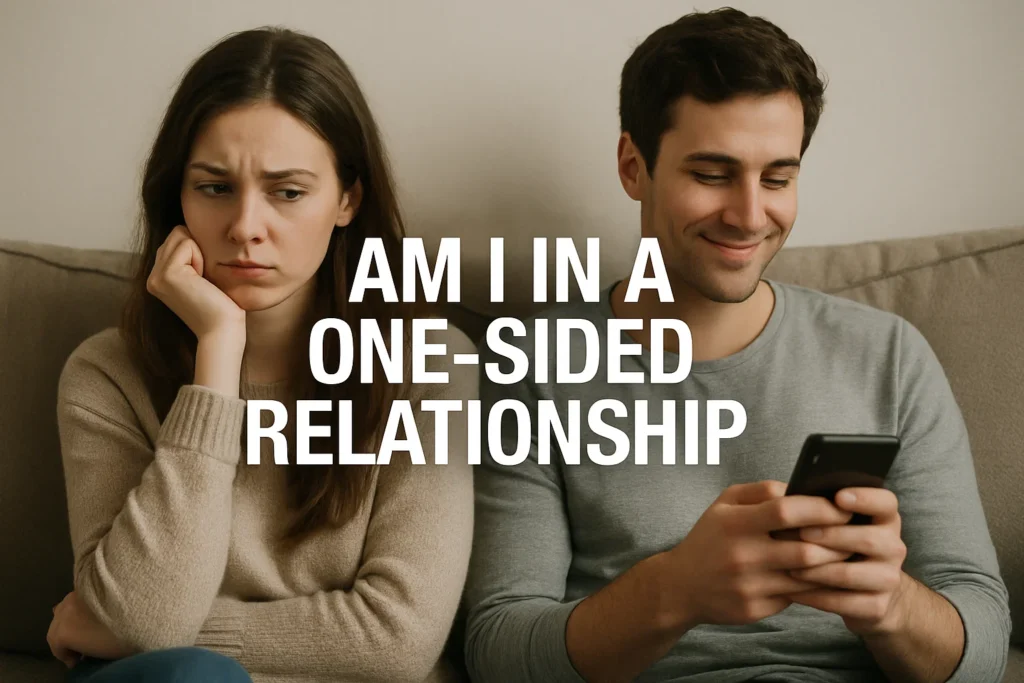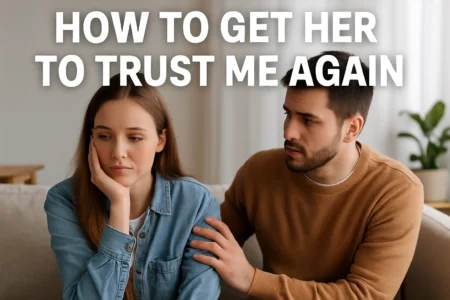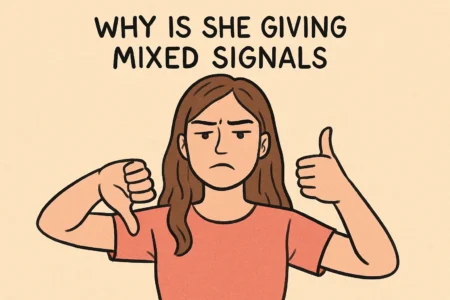There’s a special kind of loneliness that takes root when you’re supposed to be part of a pair. It’s the silence that answers you back when you speak. It’s the chill you feel when you realize you’re the only one building a fire. You start to ask yourself, are we a team, or am I just putting on a show for one person? That quiet doubt, that nagging feeling, finally forms a single, painful question: Am I in a one-sided relationship?
It’s the kind of thought that haunts you in the middle of the night. You find yourself replaying conversations, second-guessing every gesture, and trying to measure effort on an invisible scale. It feels like you’re the only one rowing the boat while your partner just enjoys the scenery, maybe trailing a hand in the water. You give and you give. You keep on giving, convinced that one day things will finally balance out. But they don’t. If this feeling is achingly familiar, please know you’re not making it up. Seeing the imbalance for what it is represents the first, bravest step toward finding your footing again—whether that’s together, or on your own.
More in Relationship Health Category
Key Takeaways
- A one-sided relationship isn’t just a rough patch; it’s a constant, draining imbalance of effort, emotional energy, and support.
- Major signs include always being the one to text first, make plans, and carry the heavy weight of the relationship’s emotional needs.
- If your feelings, needs, and wins are regularly ignored or downplayed, that’s a huge red flag that you’re in an unequal partnership.
- Feeling perpetually exhausted, anxious, or lonely within your relationship is not normal. It’s a clear signal that the dynamic is unhealthy for you.
- Spotting these signs isn’t about placing blame. It’s about getting the clarity you need to finally ask for what you deserve: a relationship built on true, mutual respect.
Does It Feel Like You’re Always the One in Motion?
Every relationship has its own pulse, a give-and-take that flows naturally. But when it’s lopsided, it’s not a dance. It’s you, trying to push a heavy boulder up a steep hill. All by yourself. This is usually where the first real doubts begin to creep in. You take a hard look at the day-to-day and it hits you: if you weren’t constantly pushing, everything would just stop.
It’s utterly exhausting.
You’ve somehow become the relationship’s CEO, event planner, and sole cheerleader. Your partner, meanwhile, seems happy to be a passenger, never once offering to grab the wheel or even glance at a map. This goes beyond keeping a tally of who-did-what. It’s about the bone-deep certainty that if you ever stopped pushing, the whole thing would fall apart.
Are You the Only One Making Plans?
Take a second and think about the last five dates you had. Who put them together? Who looked up the restaurant, bought the movie tickets, or arranged the babysitter? If you’re the one doing all the heavy lifting, you’re carrying an unfair burden. Being the planner-in-chief doesn’t just mean you handle the fun stuff; it means you’re also spending all the mental energy it takes to make those memories happen.
I once spent weeks planning a huge surprise 30th birthday for an ex. I was secretly calling his friends from out of state, booking a private room, and even ordering a custom cake. I poured everything I had—my time, my energy, my money—into that one night because I wanted him to feel truly seen and celebrated. And he did. For that night. When my birthday came around two months later, he turned to me the day before and asked, “So, what are we doing?” No plan. No dinner reservation. Nothing. The resounding silence of his inaction told me everything I needed to know about how much he valued my happiness compared to how much I valued his.
Who Starts the “Good Morning” Texts?
It sounds so small, doesn’t it? But who initiates contact every day says a lot. Are you the one who always sends the first text? The one who calls just to check in? The one who forwards a funny video you know they’d love?
These little moments are the glue of a relationship. They’re tiny signals that say, I’m thinking of you right now. When you’re the only one sending them, it feels less like a conversation and more like you’re just talking to yourself. You can’t help but wonder if they’d even reach out if you stopped. And sometimes, in a moment of quiet pain, you try it. You put your phone down. You wait. The hours of silence that stretch out before you are a harsh, but clear, answer. You are the one holding the string of connection.
Is Your Emotional Gas Tank Always on Empty?
Logistics are one thing, but emotional labor is a much heavier load to carry. It’s all the invisible work: managing moods, anticipating needs, and calming anxieties for both of you. In a healthy partnership, that weight is shared. In a one-sided one, you’re the designated caretaker, and your own well of emotional energy is almost completely dry.
You find yourself constantly walking on eggshells, carefully editing your words to keep the peace. You provide an endless supply of support for their bad days, while your own struggles get shoved to the back burner. You become a specialist in their emotional state, so much so that you lose touch with your own. This constant emotional output without any input is a fast track to burnout. It will leave you feeling drained, resentful, and more alone than ever.
Do You Feel More Like a Therapist Than a Partner?
When your partner has a crisis, you’re their first call. You drop everything. You listen, you strategize, you talk them through it. You are their rock, their sounding board, their unwavering support system. You do it without a second thought, because you care.
But what happens when it’s your turn? When you’re the one having a terrible day, do they offer that same focused support? Or do you get a distracted, “Wow, that sucks,” before they immediately steer the conversation back to their own life? When you are always the provider of comfort but never the recipient, it’s no longer a partnership. It’s a service. Your role changes from an equal to an unpaid therapist, and true intimacy dies, replaced by a hollow sense of duty. You deserve someone who is as committed to your well-being as you are to theirs.
Are You Making All the Sacrifices, Big and Small?
Compromise is essential. It’s how two people with different needs find a way to meet in the middle, feeling heard and respected. Sacrifice, however, is different. It should be a rare thing, and it must go both ways. In a one-sided relationship, you’ll look around and realize your life has been completely reconfigured to fit theirs, while their life has barely changed at all.
This isn’t just about huge decisions, like relocating for their career. It’s in the thousand tiny cuts of daily life. You’re the one who always has to cancel on your friends when they want to hang out last-minute. You’re the one who takes up their hobbies as your own interests collect dust. Slowly, without you even noticing, your world starts to shrink until it fits neatly inside theirs.
Who Is Always the One to Travel?
I was in a long-distance relationship where, for two years, I was always the one to get on the plane. Every single visit. I was the one using up my vacation days, navigating airports, and spending money I barely had, all to close the distance between us. I made excuses for him. My schedule is more flexible, I’d tell myself. I don’t mind the travel, I’d lie.
The reality was that I would have done anything to see him, and he knew it. I would gently hint at him visiting my city, sending him ideas for fun things we could do. The excuses were always ready: work was just too crazy, he was saving up for something, he couldn’t get away. But I was making the very same sacrifices he claimed were impossible for him. It finally hit me when I calculated that I’d spent thousands of dollars just to see someone who wouldn’t even spend a weekend to see me. It was never about logistics. It was about effort.
Have Your Needs Become an Inconvenience?
Maybe the most heartbreaking sign of an unequal relationship is when you start to feel like your own needs are a complete inconvenience. You stop asking for what you want—whether it’s a hug or a serious talk about your future—because you can already predict the heavy sigh, the impatient eye-roll, or the flat-out refusal.
So you learn to be quiet. You swallow your own disappointments and just go along with what they want because it’s easier than the fight. You might even tell yourself you’re just being “easy-going,” but the truth is you’re slowly deleting yourself from your own relationship. A partner who loves you should see your needs as a chance to show they care, not as a chore.
How Does Your Partner Talk About the Future?
Listen closely to the words your partner uses when they talk about the future. Is it a future built with “we” and “us,” or is it a solo act starring “I” and “me”? Someone who sees a real future with you will naturally weave you into their plans, from what you’re doing next weekend to where you’ll be in five years.
If their dreams and goals are always singular, it’s a glaring sign that they don’t see you as a permanent part of their life. They’ll talk about a vacation they want to take, a promotion they are working toward, or a city they want to live in, and you’re never mentioned in the picture. That’s not a simple mistake. It’s a window into their mindset.
Do They Shut Down When You Bring Up Commitment?
For me, this was the moment of painful clarity. After more than a year together, I felt like we were stuck. I tried to gently open up conversations about where we were headed. I wasn’t asking for a ring, just simple things, like meeting his parents or planning a trip together for the summer.
Every single time, a wall would go up. He’d get quiet. He’d change the subject. He’d offer some vague platitude like, “Let’s just live in the moment,” that left me feeling foolish and insecure. It hit me hard: I was the only one trying to build something. He was perfectly happy right where he was, with no plans to move forward. I was thinking in terms of “we,” while he was still living his life as an “I.” We weren’t just on different pages; we were in completely different books.
Think About Your Last Big Accomplishment. How Did They React?
Your partner should be your number one fan. When you have good news, they should be the one leading the celebration, making you feel like you can do anything. Their excitement should be real. Your joy should be their joy.
In a one-sided dynamic, your biggest wins are met with a startling quiet. That promotion you worked so hard for, that personal goal you finally crushed—it gets a quick, “Oh, cool,” before the conversation immediately shifts back to their day. It’s more than just being self-absorbed; it’s a sign that they aren’t truly a part of your life. As research from the University of Rochester confirms, how a partner reacts to your good news is a powerful predictor of a relationship’s success. A supportive partner gets excited with you. A passive one can make your biggest wins feel small and unimportant.
Did They Make Your Success About Them?
Even worse than quiet indifference is when your partner finds a way to subtly diminish your victory or, somehow, make it about them. They might hear your good news and immediately counter with a bigger, better story of their own. Or they might find the one potential cloud in your clear blue sky.
For instance, you get a big raise, and the very first thing they say is, “Does this mean you’ll have to work even later?” Suddenly, the moment of celebration is gone, replaced by how your success might inconvenience them. This isn’t just insecurity; it’s a profound self-centeredness that is poison to a real partnership. Your wins should feel like a win for the team, not a problem for your partner to solve.
What Now? Recognizing the Imbalance Is the First Step
Getting to the end of this list might feel like a punch to the gut. It’s a painful thing to see the reality of your relationship staring back at you. You might feel angry. You might feel heartbroken. You might feel a desperate need to make excuses for your partner’s behavior. Let yourself feel it all. Just breathe.
The point of this isn’t to label your partner as a villain or to write off your relationship as a failure. The point is clarity. For a long time, you’ve known something was wrong, and now you have the words for it. You are not “too sensitive.” You are not “needy.” You are a person in a relationship that is not giving you the basic reciprocity you need and deserve.
Here’s the hard truth: you cannot force someone to meet you in the middle. You can’t make them care more, try harder, or see your worth. The only thing you can control is what you do now that your eyes are open. This is your chance to stop pushing that boulder. Just for a moment. See what happens. Maybe your partner will finally notice and start pushing with you.
Or maybe, everything will stop, proving that you were the only one holding it all together. Either way, you get the truth. And with the truth, you can finally start building a life—with or without them—where you are seen, where you are valued, and where your love is returned. You deserve a partner who rows the boat with you.
FAQ – Am I In A One-Sided Relationship
What are the key signs that indicate I am in a one-sided relationship?
Major signs include always being the one to initiate contact, make plans, or carry the emotional load, and feeling exhausted, anxious, or lonely despite the relationship.
How can I tell if I am always the one making plans or reaching out?
If you find yourself consistently organizing dates, sending good morning texts, or making the effort to check on your partner without reciprocation, it signifies an imbalance.
What does it mean if I feel like I am the only one doing emotional labor?
If you are constantly managing moods, calming anxieties, and supporting your partner’s emotional needs while your own are ignored, it indicates a one-sided dynamic that can lead to burnout.
How do I recognize if my partner’s future plans exclude me?
If they speak about their future using ‘I’ and ‘me’ rather than ‘we’ and ‘us,’ and do not include you in their long-term goals or dreams, it suggests they do not see you as a permanent part of their life.
What should I do if I realize I am in a one-sided relationship?
Acknowledge the imbalance and consider what actions you want to take, whether that’s addressing the issues with your partner, seeking support from friends or a counselor, or making the difficult decision to leave if your needs are continually unmet.





